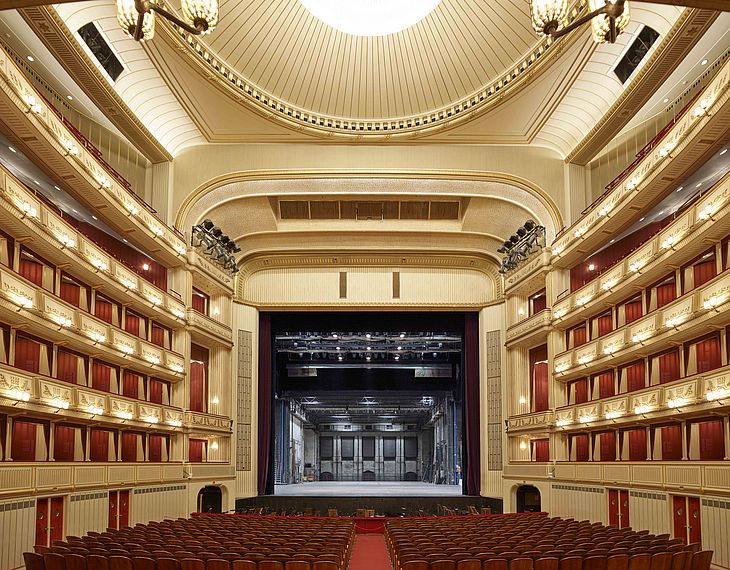Live audiences to return to London’s Wigmore Hall
From 13 September to 1 November, Wigmore Hall is reopening its doors to live audiences. The seven-week-long concert series will involve at least 60 concerts with auditorium capacity restricted to 56 – 10% of full capacity – in compliance with the government’s social distancing guidelines. Additional concerts will be staged without an audience, with all in the series livestreamed on the Wigmore Hall’s website.
Artists featured include pianists Igor Levit, Mariam Batsashvili and Andras Schiff, cellist Gautier Capuçon, violinists Leonidas Kavakos, Julia Fischer and Renaud Capuçon, clarinettist Martin Fröst, harpsichordist Mahan Esfahani and baritone Gerald Finley.
This announcement follows Radio 3’s live Lunchtime Concert broadcasts from Wigmore Hall, which have been running since June with an empty auditorium.

Kultur und Corona in Österreich: «Das Schlimmste kommt noch»
Die Wiener Sängerknaben sind von der Corona-Krise bedroht. Dem ein halbes Jahrtausend alten Kinderchor – Habsburger Erbe, das auf Konzerten weltweit die «Kulturnation Österreich» verkörpert – geht nach eigenen Angaben im Herbst das Geld aus. Bis Weihnachten fallen zwei Millionen Euro Einnahmen weg. «Bei uns ist die Situation wie bei vielen anderen Kulturinstitutionen, dass seit Anfang März alle Konzerte abgesagt werden mussten», sagt Vereinspräsident Gerald Wirth. Vor ähnlichen Problemen stehen Off-Bühnen, Veranstalter und andere Kulturbetriebe. Die Jungen im Matrosendress dürfte vermutlich ihre Rolle als kulturelle Botschafter der Alpenrepublik retten. Anderswo sieht es finsterer aus.
Die Corona-Pandemie macht Österreichs Kulturszene, die das Land so sehr ausmacht, schwer zu schaffen – und das Schlimmste, so sagen viele, steht erst noch bevor. Flaggschiffe wie Staatsoper und Burgtheater blicken – trotz Staatsmillionen – mit Unwohlsein in Richtung Jahreswechsel. Viele Kleinere starren in den Abgrund.

Culture and Corona in Austria: “The worst is yet to come“
The Vienna Boys Choir is threatened by the Corona crisis. According to their own statement, the half a millennia old children’s choir – Habsburg heritage, which embodies the “cultural nation Austria” at concerts worldwide – will run out of money in autumn. Two million euros in income will be lost by Christmas. “With us, as with many other cultural institutions, the situation is that since the beginning of March all concerts have had to be cancelled,” says association president Gerald Wirth. Off stages, organisers and other cultural institutions are facing similar problems. The boys in sailor’s dress should probably save their role as cultural ambassadors for the Alpine Republic. Elsewhere things look darker.
The corona pandemic is giving Austria’s cultural scene, which makes up the country so much, a hard time – and the worst, many say, is yet to come. Flagships such as the State Opera and the Burgtheater are looking ahead to the turn of the year with unease – despite millions in funding. Many smaller ones stare into the abyss.
Andrea Bocelli provoque le scandale en Italie
Le ténor italien a estimé que les mesures pour lutter contre le Covid-19 étaient « trop alarmistes ». Ses déclarations ont du mal à passer dans le 5e pays le plus touché par l’épidémie dans le monde.
C’était lors d’un congrès, organisé ce lundi. Andrea Bocelli prend la parole et tacle les mesures gouvernementales dédiées à la gestion de la crise sanitaire. Devant le Sénat italien, l’artiste est présenté par le leader de l’opposition de droite, Matteo Salvini, qui lui aussi, s’est élevé contre les mesures prises par l’État pour endiguer l’épidémie.
La star internationale – d’ailleurs nominée aux Grammy – a déclaré qu’il était « indigné » de ne pas pouvoir quitter son domicile alors qu’il n’avait « commis aucun crime ». « Je me suis senti humilié et offensé d’avoir été privé de ma liberté de sortir », déclare-t-il selon le Corriere della Sera.

Andrea Bocelli causes scandal in Italy
The Italian tenor felt that measures to combat Covid-19 were “too alarmist”. His statements have difficulty getting through to the 5th most affected country in the world.
It was during a congress, organised this Monday. Andrea Bocelli took the floor and tackled the governmental measures dedicated to the management of the health crisis. In front of the Italian Senate, the artist was introduced by the leader of the right-wing opposition, Matteo Salvini, who also spoke out against the measures taken by the state to contain the epidemic.
The international star – a Grammy nominee – said he was “outraged” that he could not leave his home when he had “committed no crime”. “I felt humiliated and offended to have been deprived of my freedom to go out,” he said, according to Corriere della Sera.
 BACK
BACK